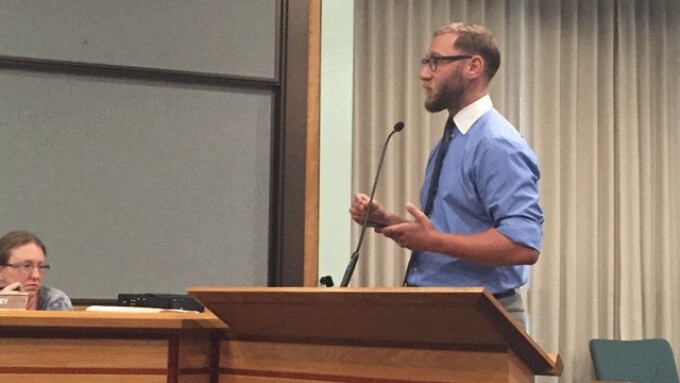WALNUT CREEK, Calif. — Cal/OSHA’s Standards Board on Thursday voted, 6-0, to send two proposals that would amend or expand rules for bloodborne pathogen exposure in the adult film industry to an advisory committee.
The advisory committee will evaluate dialogue from stakeholders — inclusive of adult entertainment performers, the Free Speech Coalition and the AIDS Healthcare Foundation — to continue with the next step to consider amending or expanding § 5193, the board said.
The FSC in a petition sent to the board this spring said that it requested regulation that left other means that do not require the use of barrier protection and that would leave options for protection and prevention through testing protocols and medical advances, like PrEP.
The AHF’s petition was a repeat of its Petition No. 513, which was defeated in February by the same board because it did not get the required votes.
Prior to today’s vote, the Standards Board heard testimony during a public comment period from nearly two dozen adult industry performers who railed against the AHF’s plan to dramatically expand rules for adult productions.
Performers who made the trip to Walnut Creek, Calif., to testify in front of the board included Ela Darling, Marcelo Slave, Jiz Lee, Brock Doom, Janice Griffith, Verta, Owen Gray, Kevin Kintaro, Ariel X, Julia Ann, Iona Grace, Arabelle Raphael, Nicki Darling, Justin Willis and wife, Mimosa and Mona Wales.
Industry attorney Karen Tynan, FSC Executive Director Eric Paul Leue, NakedSword director Mr. Pam, Dr. Hernando Chavez and lobbyist Kevin Bland also testified on the issues at hand — all advocating that the board discard Petition No. 557, which was authored by the AHF and Michael Weinstein, the group’s president.
The adult entertainment stakeholders, instead, advocated for Petition No. 560, authored by the FSC and Leue.
Cameron Bay, Rod Daily, Adam Cohen, Penny Flame, Cordova and Vanessa Blake provided testimony for the AHF’s camp’s petition.
During testimony, many of the performers backing the FSC said that Petition No. 560 appealed to them if they were to face further government regulation. Of course, the AHF’s group said that barrier control is the only option on the table.
But, in the end, both petitions were shelved to make way for an advisory committee to make findings and report back to the Standards Board.
Fingers started pointing at one point during the monthly Standards Board meeting, which rotates among a handful of California cities, including Walnut Creek.
Leue in his testimony noted that the AHF hasn’t been playing fair in the political heat.
Leue said that the AHF recently shared private personal details with the news media, including the home address of a performer, that were un-redacted from a Cal/OSHA document, forcing her into hiding.
Also, in a startling revelation, mr. Pam asserted in her testimony that one of the AHF’s proponents, Rod Daily, was disingenuous about his exposure to bloodborne pathogens on the set. Daily, in 2014, announced he was HIV-positive after performing in an adult film, and since then has taken the side of the AHF.
“It doesn’t make sense,” mr. Pam said. “Throughout all the years he was condom-only when he shot for me.”
With the determination made to move dialogue to an advisory committee for a later report to the Standards Board, some panel members pointed out that they sought to clarify the ground rules.
“We recognize there is value to moving this forward, but there is no reason to discuss issues that have already been decided,” said Marley Hart, the Standards Board’s executive officer. “We don’t want to rehash the same issues that we’ve gone over for years.”
One of the board members, David Harrison, noted that he’s interested in hearing from the advisory committee solutions that both sides can agree on, but, “I won’t vote for any action that will create an ‘underground economy’ for [adult performers].”
“If that’s the case, I will not support that,” Harrison said.
Barbara Smisko, another board member, echoed what several other panelists said — that the Standards Board doesn’t have the option of adopting a standard less effective in protecting adult performers than the federal standard of using barrier controls like condoms.
“There is no substitute for barrier protection,” she said. “We are not in a position to let workers in California take risks. It’s like the construction worker going out on a job and saying, ‘I’m not going to wear a hardhat.'"
David Thomas, board chair of the Standards Board, said: “It’s already the law. You have to get over it.”
“Unless the feds change their view on this and their regulation, we’ll have to comply,” Thomas said. “I know we are playing games, but something has to be done. We’re not just going to sit on this.”
Pictured: Eric Paul Leue at today's hearing








